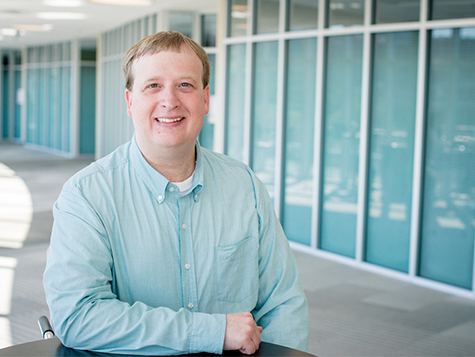 Sean Hollis, Ph.D.A new concussion clinic will support people who are recovering from a mild traumatic brain injury. The Spain Rehabilitation Neuropsychology Concussion Clinic at the University of Alabama at Birmingham will provide continuing care for adults who have experienced a concussion. The clinic will be led by Sean Hollis, Ph.D., a clinical neuropsychologist who specializes in traumatic brain injury.
Sean Hollis, Ph.D.A new concussion clinic will support people who are recovering from a mild traumatic brain injury. The Spain Rehabilitation Neuropsychology Concussion Clinic at the University of Alabama at Birmingham will provide continuing care for adults who have experienced a concussion. The clinic will be led by Sean Hollis, Ph.D., a clinical neuropsychologist who specializes in traumatic brain injury.
Currently, there is not a clinic in the Birmingham area that focuses on care for adults after they are diagnosed with a concussion.
“We are hoping to fill that need for the community,” Hollis said. “Concussions are the most common type of brain injury, and some people continue to experience various post-concussive symptoms such as headaches, diminished thinking abilities, some visual changes and emotional issues. There are a lot of ambiguities out there, among patients and among providers, about how to treat these symptoms, how long they should be lasting and what sorts of interventions are needed. We want to provide a service to help people understand what they are experiencing and manage their symptoms.”
Amy Knight, Ph.D., the division director of Rehabilitation Psychology in the Department of Physical Medicine and Rehabilitation, says concussions make up about 80 percent of brain injuries; but in most cases, they are diagnosed in the emergency room and patients are discharged the same day or a day later. Mild brain injuries are expected to recover well, although some patients experience difficulty in returning to normal activities and report symptoms that are not improving over time as anticipated.
“The need for a concussion clinic is to help distinguish what is going on if those symptoms continue for weeks,” Knight said. “We want to help diagnose what is really going on, if it is a result of the concussion or if there is another issue that may explain symptom presentation. Our goal is to provide post-concussion support to try to catch underlying issues sooner rather than later.”
“When concussion symptoms persist, some patients may become depressed or anxious because their symptoms are not going away,” Hollis said. “In turn, this can worsen their symptoms further. We want to provide follow-up neuropsychological assessments to see how their cognitive and thinking skills are doing. We also want to provide education about what typical symptoms of a concussion are and what people should expect. Patients should not go months without returning to regular activities because they think they are still healing from their initial injury when in fact they may instead be dealing with residual pain or depression or anxiety.”
One of the greatest issues facing patients who have long-lasting symptoms is a feeling of not being able to get back into a regular routine.
“Patients may have difficulty transitioning back to work or school following their injury, especially if they are experiencing some degree of persistence in symptoms,” Knight said. “Some patients may reduce or eliminate routine daytime activities, sleeping excessively during the day, and ultimately limiting leaving the house at all. This can lead to further deconditioning and can exacerbate problems.”
Education is another important element of the clinic.
“We want to help people deal with these issues and educate them about potential long-term symptoms, so they know what to do if they experience these problems,” Hollis explained. “A lot of it is managing the symptoms. We can provide recommendations and relevant referrals for dealing with cognitive complaints such as forgetfulness, slowed thinking, and difficulty concentrating. If they are experiencing depression or anxiety, we can help them cope with it. If they are experiencing dizziness, we may refer them to a physical therapist to help treat it. We want people to reestablish their regular routines and not feel like they cannot resume their lives due to residual symptoms of a concussion.”
An important aspect of the clinic is same-day feedback regarding testing results and an explanation of current cognitive profiles with strengths and weakness. The results of the neuropsychological assessment will also guide recommendations for how to best adapt to return to highest level of daily functioning possible, which are provided to the patient on the same day as their assessment.
Patients will be referred to the clinic by their health care providers. For more information, contact Spain Rehabilitation Center at 205-934-4131.